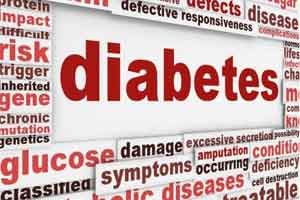- Home
- Editorial
- News
- Practice Guidelines
- Anesthesiology Guidelines
- Cancer Guidelines
- Cardiac Sciences Guidelines
- Critical Care Guidelines
- Dentistry Guidelines
- Dermatology Guidelines
- Diabetes and Endo Guidelines
- Diagnostics Guidelines
- ENT Guidelines
- Featured Practice Guidelines
- Gastroenterology Guidelines
- Geriatrics Guidelines
- Medicine Guidelines
- Nephrology Guidelines
- Neurosciences Guidelines
- Obs and Gynae Guidelines
- Ophthalmology Guidelines
- Orthopaedics Guidelines
- Paediatrics Guidelines
- Psychiatry Guidelines
- Pulmonology Guidelines
- Radiology Guidelines
- Surgery Guidelines
- Urology Guidelines
Driven by adult BMI, earlier onset of periods linked to diabetes later

Earlier onset of periods is associated with diabetes in later life, likely driven by adult BMI, finds a new study. Study results are published in Menopause, the journal of The North American Menopause Society (NAMS).
It's been well documented how diet and exercise influence risk of type 2 diabetes; however, the new study suggests that early menarche also is associated with a higher risk, but body mass index (BMI) may mediate this association.
Diabetes is a global health concern expected to affect 693 million people worldwide by 2045. Type 2 diabetes mellitus has become one of the most common diseases worldwide. In 2015, it affected nearly 8.8% of people aged 20 to 79 globally, and by 2040, it is expected to affect 10.4%. With so many people affected, it is not surprising how much research has been devoted to identifying determinants of the disease in order to prevent its development. Various lifestyle and environmental factors have already been confirmed, but there is also growing evidence pointing to some physiologic factors.
A new study analyzing more than 15,000 postmenopausal women in China has found that women who begin menstruating at an earlier age have a higher risk of developing type 2 diabetes. More specifically, each year of delay in menarche age correlated with a 6% lower risk of type 2 diabetes.
Although this is not the first study to suggest the association between menarche and diabetes, it provides added evidence regarding the increased risk, as well as the fact that BMI can partially mediate the association and the proportion of that effect is 28%. Study results appear in the article "Early menarche is associated with an increased risk of type 2 diabetes in rural Chinese women and is partially mediated by BMI: the Henan Rural Cohort Study."
"This study of rural Chinese women indicates that the average age of menarche is delayed relative to western countries at 16.1 years and is linked with a lower risk of type 2 diabetes. Earlier onset of menses (14 y) was associated with diabetes in later life, likely driven by adult BMI. Other factors such as nutrition and BMI in childhood may also play a role in this association," says Dr Stephanie Faubion, NAMS medical director.

Disclaimer: This site is primarily intended for healthcare professionals. Any content/information on this website does not replace the advice of medical and/or health professionals and should not be construed as medical/diagnostic advice/endorsement or prescription. Use of this site is subject to our terms of use, privacy policy, advertisement policy. © 2020 Minerva Medical Treatment Pvt Ltd